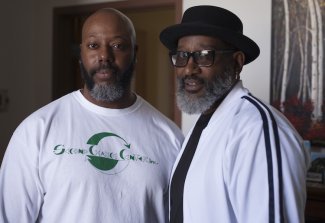
“Even though some of us completed our sentences more than ten years ago, we’re still paying for our past mistakes,” says Ingrid Archie, organising director of the Time Done campaign in Los Angeles and a former prisoner, photographed on 25 October 2022.
Jay Jordan relishes in his victory. In September 2022, the 37-year-old ex-convict from California who heads the Alliance for Safety and Justice, an organisation committed to criminal justice reform, won a major political battle.
For months, Jordan campaigned throughout the Golden State for the adoption of SB731, a law that would allow people convicted of crimes to request that their criminal records be expunged after serving their sentences. A first of its kind in the United States, the bill was passed in August by the California legislature and signed into law on 27 September by California’s Democratic governor Gavin Newsom.
For Jordan, the law’s passage represents both a collective victory and one that is deeply personal. “This law opens up a whole new world of possibilities for me,” he says. Since his release from prison, his criminal record has created many obstacles and has made it hard to find a steady job.
Jordan is one of hundreds of thousands of former inmates in California who have seen their ability to reintegrate hampered by past convictions. “I grew up in Stockton [near San Francisco] in the 1980s in a community made up mainly of African-American and Hispanic families who experienced serious economic hardship,” says the son of a pastor and an engineer, who was lucky enough to “benefit from a great education” thanks to his parents.
Despite these opportunities, Jordan became involved in crime as a teenager. “I started hanging out with a bad group of people in high school. When I was 18, we tried to rob someone on the street and I was the only one who got caught”.
No one was injured in the attempted robbery. But because Jordan refused to inform on his friends and a gun was recovered from the scene, all charges were brought against him. In 2004, at the age of just 19, he was sentenced to seven years in prison.
When he was released in 2012, Jordan had a plan for his rehabilitation. “I wanted to become a barber, something I had already started doing behind bars,” he says. “I went to a barber friend of mine and while he was cutting my hair, I told him about my plans. He was the one who told me ‘Jay, you can’t get a license to be a barber if you have a criminal record’. I was absolutely stunned”.
Jordan tried to find a job but his criminal record continued to dog him. Some of the employers he applied with had him fill out a form asking him to list past convictions. Others ran automatic background checks on applicants. “I applied everywhere. Even in the fast-food industry, at McDonald’s, they didn’t want me. After the 70th rejection, I threw in the towel,” he says. “I was devastated that I couldn’t apply for any job I was qualified for because of my record”.
A friend suggested he try going through temp agencies, known for turning a blind eye to the criminal records of the precarious workers they recruit. Jordan was quickly hired to work in a supermarket warehouse. “Half of their workers were undocumented and the other half were ex-prisoners like me. We had no contract and could be fired overnight,” he says. “That’s exactly what happened to me. One day a crate fell on me and injured my hand. Since I was no longer able to work, they fired me”.
Post-prison poverty
Jordan left Stockton for Los Angeles in search of a job. With no resources, he lived in his car for several months. It was ultimately political activism that opened up new doors for him. He became involved with the Ban the Box campaign in Los Angeles, which aims to prevent employers from requiring job applicants to disclose their criminal records, and was subsequently recruited by the Alliance for Safety and Justice. He became the head of that organisation in March and began campaigning for the passage of SB731.
“The idea of sealing criminal records came to us from the United Kingdom. In the UK, ex-prisoners have their records expunged after a certain period of time, which makes it easier for them to reintegrate into society,” says Jordan. “When you get out of prison in the US, you’re already in a precarious financial situation,” he says. “This forces you to take on a poorly paid job to survive because your record prevents you from finding anything better. You then have to rent a cheap room in a dangerous area to be able to pay your bills, and the cycle continues. The idea behind SB731 was to break this vicious cycle of post-prison poverty”.
“Even though some of us completed our sentences more than ten years ago, we’re still paying for our past mistakes, even as we try to take care of our children,” says Ingrid Archie, an ex-convict from Los Angeles who serves as the organising director of the Time Done campaign, which advocates for the erasure of criminal records.
Archie was born in South Central, a low-income Black neighbourhood in Los Angeles. Now in her 40s, Archie spent the majority of her teenage years in juvenile detention facilities and was in and out of prison as an adult. “I grew up in a very violent environment. My mother had drug problems and I was left to my own devices. I got involved in crime early on. Every time I got out of prison, I found it hard to find a job. I had children to support and I couldn’t manage financially. This led me to sell drugs and I ended up back in prison,” says the mother of six. When she was released, her conviction for selling illegal substances also prevented her from accessing social assistance.
Black Americans disproportionately affected
The vicious cycle of post-prison poverty in the United States disproportionately affects Black Americans. According to a study by the University of Georgia published in 2017, 33 per cent of the African-American male population has been convicted of a crime compared with 8 per cent of the overall population. “Black former prisoners are currently faced with a system similar to the Black Codes, 19th century laws that limited the civil rights of newly emancipated Black slaves,” says Archie. “They were freed but they were not allowed to own a house, they were not allowed to move around and they had to have a job or they were sent to prison. Today, when you receive parole, you have to get a job or you go back to prison, which is very difficult if you have been convicted of a crime.”
Having a record “is not the only barrier to finding a job,” explains Hadar Aviram, professor at the University of California, Hastings College of the Law in San Francisco. “It affects many aspects of daily life. You may not be able to adopt a child, for example, or even live with someone who is in the process of adoption. You may also have difficulty renting or buying property or taking out life insurance. Your whole life is affected.”
SB731 aims to remove many of these barriers. It automatically seals non-violent felony convictions after four years. With the exception of registered sex offenders, people convicted of violent crimes are now eligible to apply to a judge to have their records expunged. According to Californians for Safety and Justice, between 250,000 and 400,000 people in California could have their records automatically sealed under the new law. The organisation also estimates that more than one million people could be eligible to file a petition with a court to have their records expunged.
According to Aviram: “SB731 is a step in the right direction even if it won’t solve the problem overnight.” More and more people in the US are being convicted “at both the state and federal level, while SB731 only applies to convictions in the California court system”.
The law also fails to address the use of legal data by the poorly regulated private companies that employers use to perform background checks on job applicants, a very common practice in the US. “There’s a real legal data industry in the United States. California will almost certainly need to pass new legislation to regulate the data that is floating around on the Internet,” says Aviram. According to a 2014 study by the Society for Human Resource Management, an association of human resource professionals, 9 out of 10 US employers run criminal background checks on applicants as part of the hiring process.
For many prisoners, however, the passage of SB731 remains a source of real hope. Former inmate Michael L. plans to petition a judge next year to have his record permanently sealed. The California man, who requested anonymity, has had most of his convictions expunged thanks to the Record Clearance Project, a programme at San Jose State University in California where law students volunteer to help former prisoners expunge their criminal records. “Thanks to them, my life has changed,” says the veteran who became a bus driver after his release from prison. “But I still have one last felony conviction on my record. When it’s removed, I will finally feel completely free. No one can hold my past against me anymore. Just thinking about it fills me with a wonderful feeling of lightness.”












